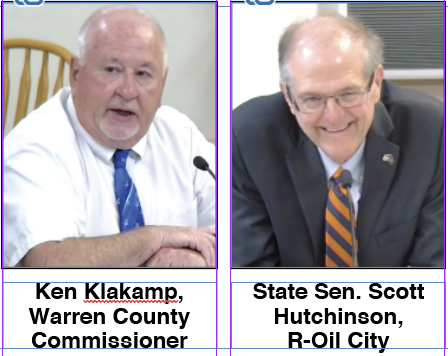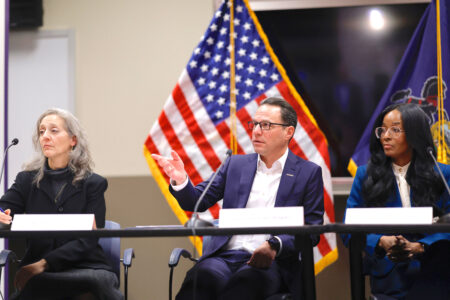County figures prominently in state hearing on Game Commission land purchases

The October 2023 transfer of more than 2,000 acres of land in Spring Creek Township to the state Game Commission is still driving conversation nearly two years later.
The state Senate Game and Fisheries Committee recently hosted a public hearing on the Game Commission’s land acquisition process. Sen. Scott Hutchinson, R-Oil City, was among the senators who took part while County Commissioner Ken Klakamp provided testimony. Commissioner Dan Glotz was in attendance at the hearing, which was held in Driftwood.
While the issue of state game land expansion is a statewide issue, the 2023 transfer was a primary point of discussion during the recent hearing .The transfer was part of a 2,195 acre land-for-oil deal between the Pennsylvania Game Commission and Pennsylvania General Energy. The property includes the historic Clough farm. The value of the property was estimated at $6 million in 2023.
Terms of the transfer saw the Spring Creek Tract, referred to as the “Glen Dorn Property” by a PGC Facebook post, transferred to the PGC along with 943 acres in Cambria County in exchange for PGE’s ability to extract oil and gas from beneath a state game land in Lycoming County. The Game Commission said in a statement that the Spring Creek Tract was considered one of the most prized in the area because of its biological diversity. It is now State Game Lands 337 – though not without controversy.
Warren County is home to 36,922.03 acres of state game lands that will be valued in 2026 under the county’s reassessment at $10,920,950, according to testimony provided by Klakamp during the hearing. Roughly one-third of Warren County’s land is owned by either the Allegheny National Forest, Pennsylvania Game Commission or the Pennsylvania State Forest.
“We have changed our strategic plan,” Klakamp said in response to a question from Sen. James Malone, D-Lititz, who asked if there is a formula that should be followed for new game lands purchases. “We do not support any more public lands. Maybe we’re behind the eight ball because a lot of Warren County is on the Allegheny National Forest. We can’t take anymore.”
One common thread between testimony from Klakamp and Kevin Klingler, president of the Pennsylvania Landowners Association and a Venango County resident, was the prevalence of state game lands in rural counties. Klingler and Sen. Cris Dush, R-Brookville, said many residents live within a 5 to 10 minute trip to a state game lands, while the distance is much further for those who live near the state’s bigger cities.
Klingler said that situation is borne out in the Spring Creek land transfer.
“Well first of all there’s a 9,000 acre game land just a mile to the west in Columbus Township and another large 7,000 acre game land a mile or half a mile to the east and a 1,200 acre game land already in that very small town of just a few hundred residents,” Klingler said. “So the need for more public land there is absolutely unnecessary. That’s the first thing I want to say and the second thing is that comes to a basic question of who should decide how much public land is in the township or a county – the local elected officials who live there and work there or unelected folks from Harrisburg?”
Stephen Smith, executive director of the state game commission, testified about the value of expanding state game lands, saying the expansions protect wildlife, increase access for hunters and those who enjoy the outdoors and create spinoff economic development through oil and gas well leases, pipelines, timber management and contracts with local companies throughout the state.
At the same time, Smith acknowledged that acquisitions need to be more strategic to address concerns from local governments and state lawmakers. Moving forward the Game Commission will look to improve public access to land that is otherwise unavailable to the public. The commission will also work to eliminate inholdings and indentures, land that may have a residence or structure that is largely surrounded by game lands. Doing so will improve safety for those who may live on land surrounded by game lands and make it easier to manage existing game land. The third priority is properties with exceptional wildlife or habitat value.
“I believe that evaluating parcels based on these criteria will help focus our efforts and provide the most value for each acquisition while also helping to ensure that game lands remain the backbone of conservation, hunting and outdoor recreation in Pennsylvania.”
Hutchinson asked for another consideration to be added to the Game Commission’s priorities at a time when the number of people hunting is decreasing. The local state senator said he is investigating potential “no net loss” legislation that would require the Game Commission to sell land if it wants to purchase land. There is currently a restriction on the commission’s ability to sell land.
“Over the last several decades the Game Commission continues to buy more or acreage,” Hutchinson said. “I had my staff put together some information about the intersection between the number of hunters in Pennsylvania, which is declining, it’s much smaller than it used to be, versus the number of acres of game lands available. I think back in 1982 there was about 2.7 acres of game lands available per hunter. The numbers we were able to get I think from 2023, there’s now 5.1 acres per hunter. Should that also not be part of your decision-making process about how much land we buy? If the number of hunters continues to decrease and you continue to buy more game lands, I mean, what’s the magic number – 20 acres per hunter?”




